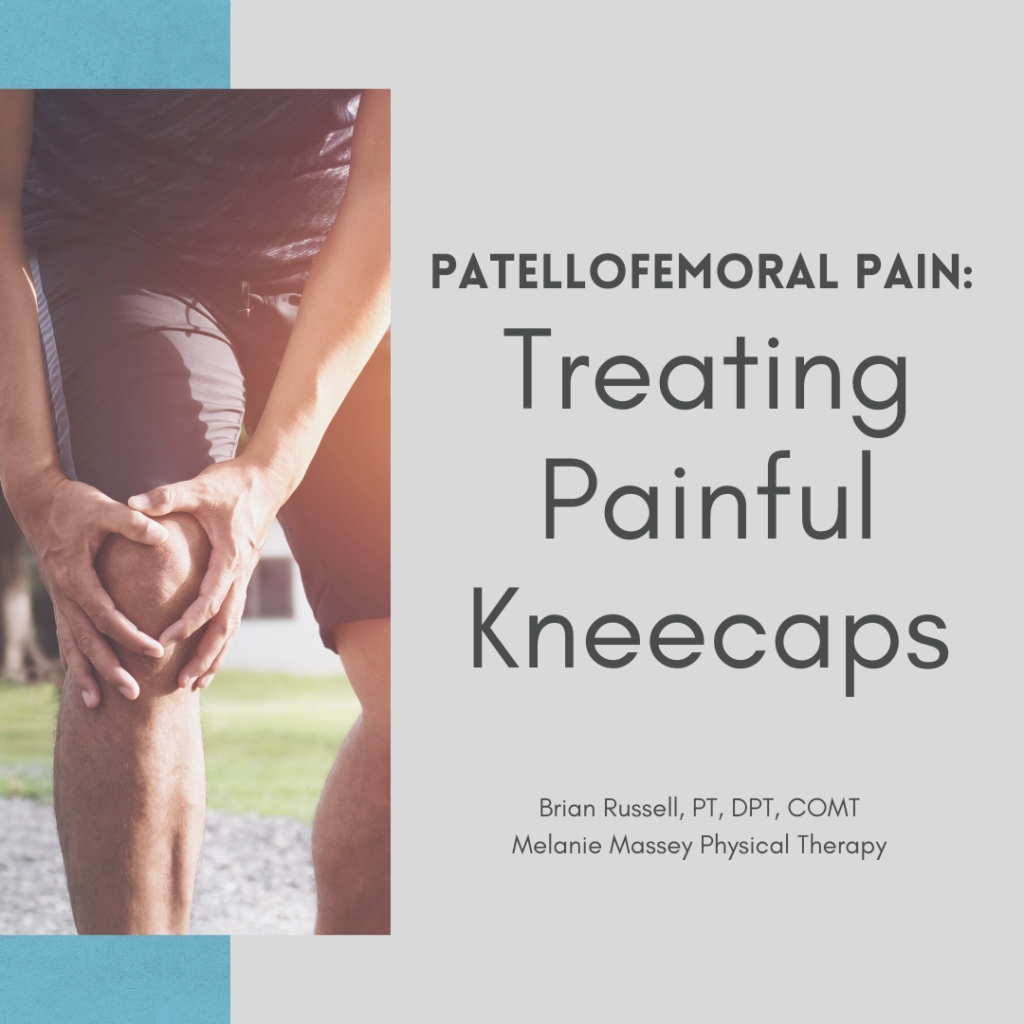Patellofemoral Pain: Treating Painful Kneecaps

Patellofemoral pain is a type of knee pain that effects 25% of the general population every year. Patellofemoral pain is often known as “kneecap pain” or “runner’s knee”. Women experience kneecap pain twice as often as men.
Patellofemoral pain can usually feel like throbbing pain on the inside or outside of the kneecap, and it’s usually caused from sitting with your knee bent for an extended period of time (like going to a movie), from going up and down stairs, after a long run, from increasing your running or walking distance too quickly, or from walking or running on un-level ground or hills. All of these activities can lead to a dull ache or a deep, throbbing pain in the kneecap.
At MMPT, we can prescribe specific exercises that can correct the underlying problems. We can teach you to exercise correctly without pain, as well as provide electrical stimulation and moist heat for pain. We can look at providing kinesio tape, braces, shoe inserts, or shoe recommendations. We also provide hands on therapy like manual therapy to improve the flexibility of the muscles, the mobility of the joints, and to decrease your pain.
Patellofemoral pain is a type of friction that occurs between the kneecap and the femur. This friction or inflammation is usually caused from either weakness in the hip and the knee and/or tightness in the hip and the knee. Your physical therapist can evaluate your hip, knee and ankle, and also look at your trunk muscles to diagnose the problem(s) causing this friction. Patellofemoral pain usually effects athletes, people who have just increased an exercise program, or people who perform physical labor for a living.
NEW INSIGHTS
The guidelines that we follow for diagnosing and treating kneecap pain are from the Journal of Orthopaedic & Sports Physical Therapy. To develop these guidelines, expert clinicians and researchers reviewed 4,500 scientific articles about kneecap pain published between 1960 and 2018. They chose the best research for the guidelines (271 articles) dealing with the risk factors, diagnosis, examination, outcome measures, and nonsurgical treatment options for patellofemoral pain. Ultimately, the best care is a combination of the best science, the expertise of your physical therapist, and your preferences and values. These guidelines help you and your physical therapist make the best decision for you.
PREVENTION
Prevention of kneecap pain is possible. Based on the Clinical Practice Guidelines by the Academy of Orthopaedic Physical Therapy, here are some suggestions:
- Gradually increase the amount of activity you are doing.
- Do a variety of activities. Adolescents who specialize in a single sport have a greater risk of kneecap pain.
- Maximizing your knee strength may reduce the risk of developing kneecap pain.
- Age, weight, height, and leg posture are not risk factors in developing kneecap pain.
PRACTICAL ADVICE
How can a physical therapist work with you and your kneecap pain?
- Hip and knee exercises have the most evidence as the best treatment for people with kneecap pain. We can prescribe specific exercises that are customized to your needs.
- Knee taping or inexpensive shoe inserts can be helpful in the first 4-6 weeks, but should be combined with an exercise program.
- There are no quick fixes. Exercise is the best treatment option over other options.
- We can evaluate the way you run or jump and provide biofeedback, which often helps to reduce kneecap pain.
WHAT CAN I DO TODAY?
Try keeping your knee flexed all the way for 60 seconds. Does that reproduce the pain right under your kneecap? If so, you may have patellofemoral pain syndrome. To put your knee in a position that relieves your pain, put a rolled up towel under your knee to place it at an angle where it’s slightly bent. You can also apply ice to your knee for 15 minutes to help decrease your pain.
Your physical therapist can help tailor a treatment program to reduce your symptoms, and help you return to your desired activities, sports, or work. Call us today at 318-396-1969 to set up an evaluation.
Monroe
West Monroe
Ruston
Shreveport
Monday-Friday
8am-5:30pm
Copyright © 2026 Melanie Massey Physical Therapy
